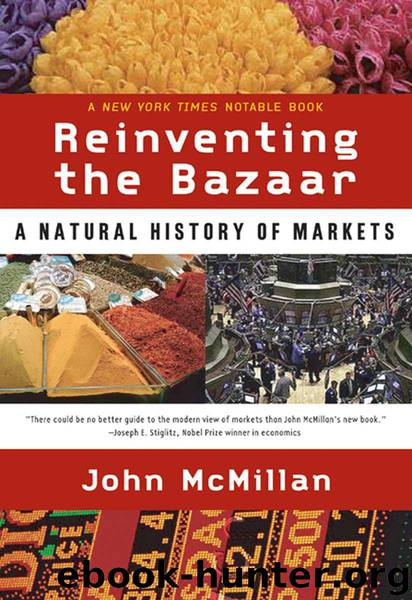Reinventing the Bazaar: A Natural History of Markets by McMillan John

Author:McMillan, John [McMillan, John]
Language: eng
Format: mobi
Publisher: W. W. Norton & Company
Published: 2009-02-13T16:00:00+00:00
A noisy demonstration took place in Kansas City in May 1999 over a curious kind of injustice. “Share the wealth,” the protesters’ placards demanded. What had aroused their anger was not world hunger or globalization or the environment or civil rights—it was a perceived inequity in baseball. The demonstration took place at a game between the Kansas City Royals and the New York Yankees, as some five thousand fans stormed out of the stadium. Some of them wore Yankees caps with dollar bills stuck to them, to symbolize that money rules baseball.
Odd as the incident was, the protesters had a point. The baseball players’ labor market is skewed. The Yankees splurge on players. Lavish spending translates into on-field success. That success can be bought is illustrated by the Florida Marlins. Spending freely, the newly founded club won the 1997
World Series. The next year it cut its payroll to less than one-fifth of what it had been by trading away its best players, becoming the worst team of the year. Between 1996 and 2000, the only other club to win the World Series was the Yankees, the club with the league’s largest salary bill. Of the 189 postseason games played from 1995 and 2000, just three were won by teams in the bottom half of the salary distribution. The gap between the payroll for the lowest team and that for the highest in 1989 was $30 million; by 1999 it had grown to $160 million. The sportscaster Bob Costas said pay disparities are the root of baseball’s ills, threatening to create a “monopoly on sustained success.”17
“There is no way we can be competitive,” complained one of the Kansas City protesters, a Royals fan. “They are more of a circus act than a baseball team. You go out there for the carnival atmosphere. You don’t go there to watch a competitive game.” Or you don’t go at all. The lack of competitive balance in the league harms all the teams, not just the poorer ones, as some fans will not pay to watch predictably one-sided games, and television ratings will fall. Fans like their own team to be somewhat better than the opposition, but not too much better. A team that wins with absolute inevitability is almost as boring as one that perpetually loses.
The data on attendance at baseball games confirm that competitive balance matters. A close competition is not the only thing. Fans like to watch the skills of outstanding players like Derek Jeter: the data show that the quality of both the home team and the visiting team significantly affect attendance. But if the quality of each separate team is held constant, attendance is higher when a close contest is expected (as measured either by the betting odds or the difference between the two teams’ recent win percentages). Statistical studies of other sports, like American football, Australian-rules football, international cricket, and English soccer, also conclude that more fans show up at games that are expected to be close.18
The history of professional sports in the United States shows the value of an even competition.
Download
This site does not store any files on its server. We only index and link to content provided by other sites. Please contact the content providers to delete copyright contents if any and email us, we'll remove relevant links or contents immediately.
International Integration of the Brazilian Economy by Elias C. Grivoyannis(111059)
The Radium Girls by Kate Moore(12028)
Turbulence by E. J. Noyes(8049)
Nudge - Improving Decisions about Health, Wealth, and Happiness by Thaler Sunstein(7707)
The Black Swan by Nassim Nicholas Taleb(7129)
Rich Dad Poor Dad by Robert T. Kiyosaki(6632)
Pioneering Portfolio Management by David F. Swensen(6300)
Man-made Catastrophes and Risk Information Concealment by Dmitry Chernov & Didier Sornette(6019)
Zero to One by Peter Thiel(5802)
Secrecy World by Jake Bernstein(4753)
Millionaire: The Philanderer, Gambler, and Duelist Who Invented Modern Finance by Janet Gleeson(4478)
The Age of Surveillance Capitalism by Shoshana Zuboff(4292)
Skin in the Game by Nassim Nicholas Taleb(4248)
The Money Culture by Michael Lewis(4207)
Bullshit Jobs by David Graeber(4190)
Skin in the Game: Hidden Asymmetries in Daily Life by Nassim Nicholas Taleb(4007)
The Dhandho Investor by Mohnish Pabrai(3765)
The Wisdom of Finance by Mihir Desai(3747)
Blockchain Basics by Daniel Drescher(3583)
